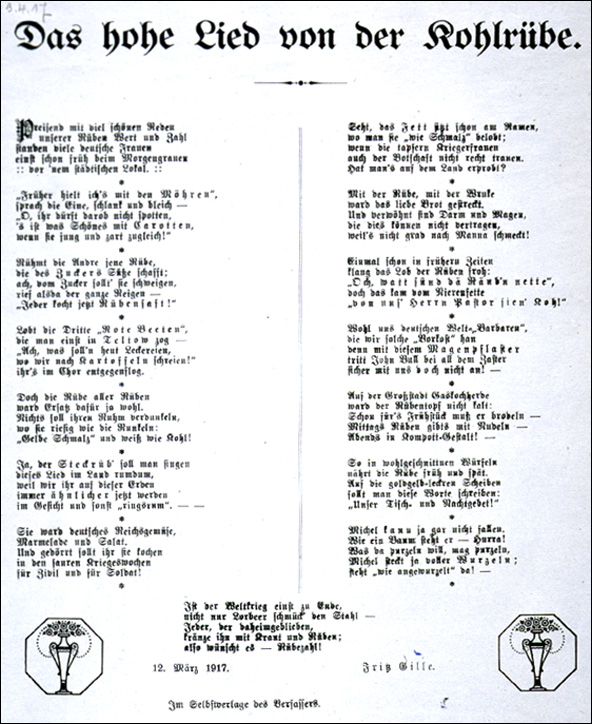Source
Praising the value and abundance March 12, 1917, Fritz Gille
Of our beets with many fine
speeches,
A multitude of German housewives once stood
At a
local city market
In the early morning’s grey light.
“I used
to stick to carrots,”
Said one woman, thin and pale,
“Oh, you
mustn’t jest about this,
There is something beautiful in these
roots,
Especially when they’re both young and tender!”
When
another woman raves about that beet
Which makes sugar oh so
sweet,
The whole crowd cries in response
That she should keep
quiet about sugar since
“Everyone is now stewing up beet
juice!”
And when a third woman extols the “red beets”
That
were once grown in Teltow near Berlin,
A chorus of voices answers
her,
”Who cares today about such delicacies
When we are crying
out for potatoes!”
But the beet of all beets
Has now indeed
replaced that root.
Nothing can dim its fame
As a giant among
root crops: it has
“Yellow lard” and is as white as
cabbage!
Yes, the rutabaga should be praised
With this song
throughout the land,
Since we here on earth are beginning
To
resemble it more and more
In our faces and also “round
about”.--
So it became the German Imperial vegetable
Both
marmalade and salad.
You should dry it and then cook it
For
both civilians and soldiers
In these sour weeks of
war!
2
Look, the fat is already in the name
When the root
is praised to be just “like lard,”
And even if the brave wartime
women
Can not quite accept this wisdom,
Has anyone tried it
out in the countryside?
With rutabaga, and with swede
The dear
old bread was spread.
And this coddles both bowel and
stomach
Which cannot quite endure
That it does not taste just
like heavenly manna!
Once long ago in earlier times
The hymn
to beets resounded merrily:
“Oh, what a nice topping we
find
On the pastor’s plate of cabbage!”
But this it seems was
kidney lard, not rutabaga.
One may well refer to us in the German
world as
“Barbarians,” because of such a special dish,
Since
with this kind of “stomach paving”
Even John Bull with all his
loot
Simply can not compete with us.
On the gas stoves in all
the big cities
The pots of rutabagas never grow cold:
They are
already boiling for breakfast—
At lunch they serve rutabagas with
noodles,
And in the evenings there’s rutabaga compote.
And so
when sliced into well-shaped cubes,
The rutabaga nourishes us from
dawn till dusk.
On these tasty golden yellow slices
One should
inscribe these words:
“Our grace and evening prayer!”
Hurray
for Michel, the German soldier, who can not fall
And stands solid
like a tree!
Whoever needs to tumble over, should tumble,
But
Michel is indeed stuffed full of roots,
And stands “as if rooted”
in the ground!
When the World War finally ends,
Not only
laurel will adorn the victor’s steel helmet—
Crown everyone who has
stayed at home
With cabbage and with beets,
So the wish of the
mythical mountain spirit, Rübezahl!
Source: Deutsches Historisches Museum